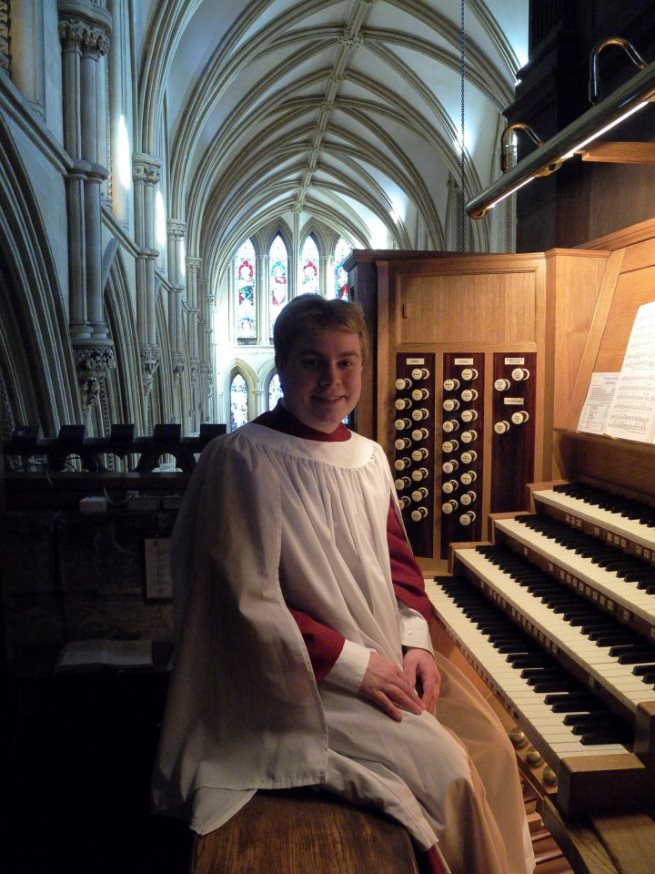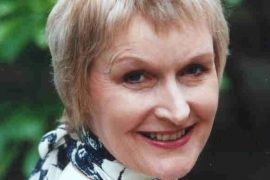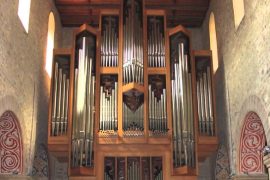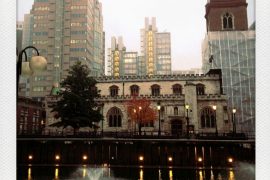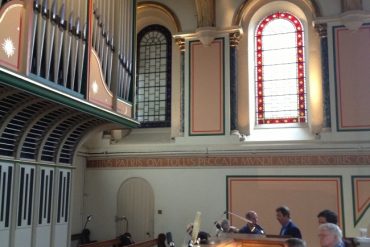Born in Worcestershire, Liam Cartwright won the Worcester Young Musician of the Year competition in 2000, and went on to study the organ with Margaret Phillips, David Graham and Sophie-Veronique Cauchefer-Choplin at the Royal College of Music, London, and in Paris. Whilst at the RCM Liam made a point of travelling extensively and playing instruments throughout Europe, and as a recitalist he has performed throughout the UK and Europe, including at key festivals such as the Three Choirs Festival and the Edinburgh Festival. In 2009 he gave a recital on the newly refurbished grand organ at St Paul’s Cathedral, London.
From 2007 to 1011 Liam was Director of Music at Great Missenden Parish Church, before being apointed Director of Music at High Wycombe Parish Church where he follows a distinguished line of musicians including Alasdair Ross and the late Richard Hickox. The church has a fine choir and an equally fine Willis organ, with a musical tradition dating back over 150 years.
While at the RCM Liam continued piano studies with Kathron Sturrock and harpsichord studies with Robert Woolley, and is now much in demand as an accompanist, educator and adjudicator in addition to his ecclesiastical work.
His next recital is at St Mary’s Northchurch, the final recital in the splendid series devised to raise money for the organ repair fund – details at the bottom of the page. In the meantime, here are Liam’s answers to my five questions:
What piece of music are you studying at the moment, and why?
I’m currently learning Edward Elgar’s Vesper Voluntaries. They are a delightful set of miniature pieces which Elgar wrote to use liturgically whilst he was organist of St. George’s Roman Catholic Church in Worcester. They also make a charming set of recital pieces, containing many of the melodic, harmonic and rhythmic devices which are so characteristic of the composer. I am originally from Worcester, so Elgar’s music is very close to my heart.
What has been your best experience as an organist?
I was invited to give a recital on the newly refurbished organ in St. Paul’s Cathedral a few years ago. It was a beautiful summer’s day and lots of friends and family attended, as well as the general public, many of whom were visiting the capital from all corners of the globe. They were hugely appreciative, and it was a real privilege to perform in this iconic, world famous building.
What has been your worst experience as an organist?
I once gave a concert in Yorkshire with a trumpet player during my RCM days. The day before the performance there was a terrible snow storm, and I had to drive up from London in a blizzard. When I eventually arrived, I found that the organ, a four manual vintage Harrison with original tubular pneumatic action, was in a very bad state, and the extreme cold had rendered much of it completely unplayable. My car then got snowed in whilst I was rehearsing and I had to dig it out in order to travel to the relatives with whom I was staying that night. We just about got through the concert the following day, but it was not an experience I would like to repeat in a hurry!
What was the best piece of advice given to you by an organ teacher? (and who was it?)
I have been fortunate to study with some very fine organists, all of whom have taught me much, but I found the approach of my postgraduate tutor at the RCM, David Graham, particularly inspiring. He encouraged students to engage with a whole range of stylistic approaches to performance, and to spend a great deal of time registering music on new organs, trying out different stop combinations, and so forth. Ideas about performance, registration, stylistic issues and the like were constantly discussed, debated and reevaluated. It was real artistry, and completely opposite to the very prescriptive way in which many people teach, whereby all their students end up sounding like clones of each other. I found it hugely liberating.
What would be your own best piece of advice for organ students?
The most important advice I give to students is to travel. Get to know the work of all the important organ builders, at home and abroad. Play Howells at Hereford Cathedral, a Widor Symphony at St. Sulpice, Liszt at Merseburg Dom, J.S. Bach in East Germany, improvise at St. Dénis…. So much of the organ repertory was written with specific instruments, or styles of instruments in mind, and it is only by visiting these instruments and taking the music to them that one truly understands the intentions of the composer and the organ builder, and therefore begins to understand the music. It is utterly revelatory and probably the most exciting thing for me about being an organist.
Liam’s next recital:
ST MARY’S NORTHCHURCH, Berkhamsted, Herts, HP4 3QW
Thursday 10 July at 8pm
Free admission, retiring collection in aid of Organ Repair Appeal
Parking to rear of church accessed from New Road
St Mary’s Northchurch website

